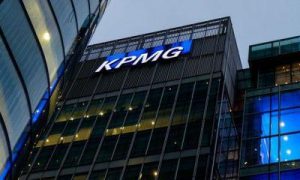By Onome Amuge
President Bola Tinubu, in his May 29 inauguration speech, set a target to raise Nigeria’s gross domestic product (GDP) growth rate to six percent on average in the next four years through budgetary reforms aimed at stimulating the real sector of the economy.
But in a recent flashnote titled, “Prospect for Attaining Six Percent Average Growth Rate in 4 years’’, KPMG Nigeria, has argued that achieving six percent average GDP growth rate in four years as envisaged by the president will be a tall order.
According to KPMG, the fact that Nigeria’s GDP will need to grow by at least six percent to generate enough jobs to absorb labour market growth, and reduce poverty, is well understood by the Tinubu administration. It, however, pointed out that the target might be difficult to attain, within the timeframe set by the president.
“The consensus of analysts is a GDP growth in 2023 of between 2.7% and 3.2%. Thus, if we assume a GDP growth of 3% in the first year, the economy will then have to grow by an average of 7% for the subsequent three years and moving growth from a forecasted 3% in 2023 to at least 7% in 2024 and afterwards, seems overly ambitious,” the professional auditing and financial advisory services firm explained.
KPMG said attaining a six percent real GDP growth on average from 2023 to 2026 means growing the value of real GDP from N74.6 trillion in 2022 to N92.5 trillion by 2026, representing an increase of N17 trillion in 4 years.

It also pointed out that the economy will need to grow an additional N17 trillion in 4 years through components of GDP such as household consumption, private sector/government investment, government consumption expenditure, real export and real import.
Highlighting some of the challenges likely to dent the president’s six percent GDP growth ambition, KPMG noted that household consumption expenditure which is the largest share of GDP and the easiest to grow is constrained by high double digit inflation, which is expected to get worse with the subsidy removal, the implementation of the finance bill 2023 and the unification of the FX rate whenever it is implemented within the next four years. This, it noted, is in addition to the perennial supply and transportation bottlenecks, security concerns and power and other infrastructural constraints to do business in Nigeria which tends to put pressure on costs of production and price of goods and services.
The KPMG note further pointed out that private investment, which accounts for the second largest share of GDP, is also constrained by the high inflationary environment and the weakness in consumption expenditure, alongside the increase in finance costs with the Central Bank of Nigeria (CBN) raising monetary policy rate (MPR) from 11 percent to 18.5 percent and this high interest rate environment is expected to remain in the short to medium term.
“The sector’s expansion is also constrained by the overall high cost of operations as well as supply and transport bottlenecks and power challenges. The initiatives government and the private sector may also have to put in place to cushion the effects of the removal of petrol subsidies may also worsen the costs of businesses and leave less for expansion in the short to medium term which covers the duration of the president’s first term and the focus of his growth targets,’’ KPMG added.
According to the flashnote, net exports are currently characterised by crude oil exports which still account for most of total exports having challenges with production which has now been capped by OPEC.
It pointed out that crude oil is unlikely to grow sufficiently in the next few years, given continuous production challenges in the sector and the recent OPEC+ quota on output at 1.38 million barrels per day, adding that growth in net exports will also be difficult as exports are unlikely to rise substantially in the short to medium term, while imports are not likely to decline.
KPMG stressed that the government’s major short-term growth strategy will therefore be to boost government investment and government expenditure, which will account for about 15 percent of the GDP, to attempt to unlock the potential of the private sector and stimulate domestic consumption and exports.
“It may therefore have no option than to borrow more or increase tax collection given the low fiscal space and despite the already high debt and debt service environment of above 50 per cent even after subsidy removal. This may however constrain GDP growth in the short term by squeezing households and businesses, this further indicates that 6 per cent on average in 4 years is unlikely,’’ it noted.
KPMG stated that it expects a stronger year on year growth over the next few years, emphasising that there is very limited space to attain a six percent average real growth rate in four years or an increase in real GDP by N17 trillion.
“We are of the opinion that an average GDP growth rate of between 4-4.5 percent at the best is more feasible in the next 4 years. Even this will require the country to get its policies right and keep consistent faith with macroeconomic reforms,’’ it stated.









